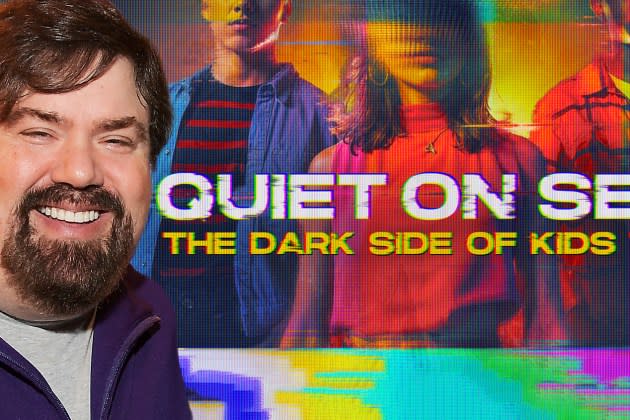Dan Schneider Sues ‘Quiet On Set’ Producers Over Investigation Discovery Limited Series For “Falsely Implying He Sexually Abused” Child Stars
- Oops!Something went wrong.Please try again later.
- Oops!Something went wrong.Please try again later.

Embattled producer Dan Schneider is fighting back against Quiet on Set, Investigation Discovery’s explosive limited series that promised to delve into the toxic and dangerous culture behind some of the most iconic kids’ television shows of the late 1990s and early 2000s.
Filed in Los Angeles Superior Court on Wednesday, the lawsuit accuses Warner Bros, Maxine Productions, Sony Pictures and producers Mary Robertson and Emma Schwartz of defamation. You can read the lawsuit here.
More from Deadline
‘Quiet On Set’: Dan Schneider, Others React To Investigation Discovery Docuseries
‘Quiet On Set’: Dan Schneider Apologizes For Behavior Depicted In Investigation Discovery Docuseries
After the series dropped, Schneider apologized for his behavior that was depicted Quiet On Set and vowed to hold himself accountable for how he acted on his Nickelodeon shows. He taped a 19-minute interview that was posted on You Tube, in which he says “watching over the past few nights was very difficult. Me facing my past behaviors, some of which are embarrassing and I regret. I definitely owe some people a pretty strong apology.”
Now, Schneider wants the series to be held accountable, too. In the lawsuit, the one-time hitmaker called the series a “hit job” that destroyed his “legacy and reputation.” The limited series that was a ratings boon for ID did reveal how two child sexual abusers did work on his shows — dialogue coach Brian Peck and former production assistant Jason Handy — but Schneider claims in the suit that he had “no knowledge of their abuse, was not complicit in their abuse.”
“No doubt defendants will endeavor to obfuscate what this lawsuit is about by pointing to what they did get right — and Schneider will be the first to admit that some of what they said are true,” the lawsuit states. “At times, he was blind to the pain that some of his behaviors caused certain colleagues, subordinates, and cast members. He will regret and atone for this behavior the rest of his life. But one thing he is not — and the one thing that will forever mar his reputation both past and present — is a child sexual abuser.”
Deadline has reached out to Warner Bros. and will update this story once the studio responds.
Schneider also released this statement after filing the lawsuit that seeks unspecified damages:
“Recently the docuseries Quiet on Set highlighted mistakes I made and poor judgment I exhibited during my time at Nickelodeon, most of which happened decades ago during my early career as a producer, working on shows for Tollin/Robbins Productions. There is no doubt that I was sometimes a bad leader. I am sincerely apologetic and regretful for that behavior, and I will continue to take accountability for it.”
“However, after seeing Quiet on Set and its trailer, and the reactions to them, I sadly have no choice but to take legal action against the people behind it,” he continued. “In their successful attempt to mislead viewers and increase ratings, they went beyond reporting the truth and falsely implied that I was involved in or facilitated horrific crimes for which actual child predators have been prosecuted and convicted. I have no objection to anyone highlighting my failures as a boss, but it is wrong to mislead millions of people to the false conclusion that I was in any way involved in heinous acts like those committed by child predators. I owe it to myself, my family, and the many wonderful people involved in making these shows to set the record straight.”
In a recent discussion with Deadline, the Quiet on Set producers addressed how Schneider’s series showed children and young teens “enacting scenes that are arguably sexual in nature.”
“One example you see Ariana Grande squeezing a potato, or Ariana Grande — who was then a young teenager — pouring water on her chest and face,” Robertson said. “And you see Jamie Lynn Spears receiving this squirt of a viscous liquid on her face. And there were many on social media who were asking, ‘Did I grow up watching these clips?’”
“I was a kid. And so the humor, if you could call it humor, went over my head,” she continued. “And if these scenes that featured teenagers that were arguably sexual in nature were made on sets with many adults around, which adult said yes and which adult said no? What was the power dynamic at play?”
Continued Schwartz, “I think perhaps the example that is most striking to me is the example of just the character Penelope Taint, which was a character that was created for The Amanda Show. Dan Schneider created this character, and he wanted it to be named with a last name that was a vulgar word for a body part, and specifically told the writers, ‘Don’t tell anyone.’ When someone from standards came and [questioned it], he said no, and just flat-out denied it. That was an example of both the power that was held but also the way in which [standards] felt there was clear intention behind the sexualization of children on the programming on these sets.”
Sign up for Deadline's Newsletter. For the latest news, follow us on Facebook, Twitter, and Instagram.

